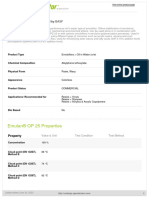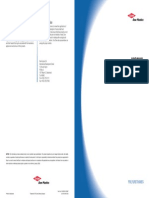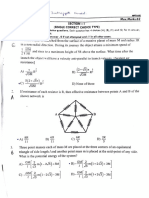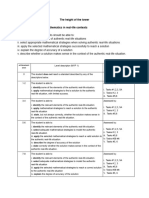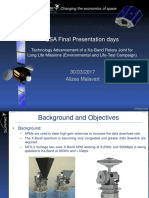Amine Value
Amine Value
Uploaded by
iqbalpec8721Copyright:
Available Formats
Amine Value
Amine Value
Uploaded by
iqbalpec8721Copyright
Available Formats
Share this document
Did you find this document useful?
Is this content inappropriate?
Copyright:
Available Formats
Amine Value
Amine Value
Uploaded by
iqbalpec8721Copyright:
Available Formats
DETERMINING EPOXIDE EQUIVALENT AND AMINE VALUE OF RESINS
TXDOT DESIGNATION: TEX-815-B
Test Procedure for
DETERMINING EPOXIDE EQUIVALENT AND AMINE VALUE OF RESINS
TxDOT Designation: Tex-815-B
Effective Date: May 2000
Texas Department of Transportation
1.
1.1 1.2 1.3
SCOPE
Use this method to determine the epoxide equivalent for epoxy resins and the amine value for polyamide resins. Reference ASTM D 1652 and D 2074 (modified by D-9-J). The values given in parentheses (if provided) are not standard and may not be exact mathematical conversions. Use each system of units separately. Combining values from the two systems may result in nonconformance with the standard.
2.
2.1 2.2
APPARATUS
Buret, 25 ml (0.85 fl. oz.), for titration. Erlenmeyer flasks, 50 ml (1.7 fl. oz.), with stoppers. two for duplicate titration used in standardization of HBr solution two for duplicate titration used for each sample of epoxy or polyamide resin.
3.
3.1 3.2 3.3 3.4 3.5
MATERIALS
Hydrobromic Acid (HBr), 47-49%, reagent grade. Acetic acid, glacial, reagent grade Potassium acid phthalate (Pht), reagent grade. Methyl violet indicator, 0.1 g in 100 ml (3.4 fl. oz.) glacial acetic acid. Methyl isobutylketone (MIBK), reagent grade. Note 1The presence of water at any time in this procedure will invalidate the results. Cloudiness in the sample or test solutions indicates the presence of water.
CONSTRUCTION DIVISION
13
EFFECTIVE DATE: MAY 2000
DETERMINING EPOXIDE EQUIVALENT AND AMINE VALUE OF RESINS
TXDOT DESIGNATION: TEX-815-B
4.
4.1 4.1.1 4.1.2 4.1.3 4.1.4 4.1.4.1 4.1.4.2 4.2 4.2.1
PROCEDURES
Standardizing Titrant: Prepare the 0.1 N HBr in glacial acetic acid by adding 8 g of hydrobromic acid to 500 ml (16.9 fl. oz.) of acetic acid. Analytically weigh 0.4 0.005 g of potassium acid phthalate into a 50 ml (1.7 fl. oz.) Erlenmeyer flask. Weigh a duplicate. Add 10 ml (0.33 fl. oz.) of glacial acetic acid to each sample and heat gently to dissolve the phthalate. Titrate the sample, using approximately 12.5 ml (0.42 fl. oz.) of the 0.1 N HBr solution, to a green color using two to three drops of methyl violet indicator (See Section 5). Use the same amount of indicator for each sample because of the small amount of solvent. The solution will change from purple to dark, then light blue until obtaining the green color. The final color change is obvious. Determining Epoxy Equivalent or Amine Value: Analytically weigh 1.0 0.001 g of the 75% solids epoxy, 0.4 0.001 g 100% solids epoxy, or 0.4 0.001 g of the 70% solids polyamide sample into a 100 ml (3.4 fl. oz.) beaker (0.75 or 0.35 g for a 100% solids sample). Use a quantity of sample that will yield 0.001 to 0.002 g equivalents of epoxy groups (See Section 5). Also run a duplicate sample. Dissolve the samples in 10 ml (0.35 fl. oz.) of MIBK acid. Just prior to titration, add 10 ml (0.35 fl. oz.) glacial acetic acid to the sample, and titrate with the standardized HBr to the same color as the standards. The endpoint for the amine value is not the same as for the epoxide procedure. The amine value solution turns milky, then green.
4.2.1.1 4.2.1.2 4.2.2
5.
5.1
CALCULATIONS
Calculate the normality of the HBr solution:
Normality of HBr Solution =
Weight of Pht 1000 204.2 mL of HBr
CONSTRUCTION DIVISION
23
EFFECTIVE DATE: MAY 2000
DETERMINING EPOXIDE EQUIVALENT AND AMINE VALUE OF RESINS
TXDOT DESIGNATION: TEX-815-B
5.2
Calculate the epoxy equivalent of epoxy resins:
Epoxy Equivalent = 1000
5.3
Weight of Sample % NVM (fraction) Normality of Hbr mL of Hbr
Calculate the amine value of polyamide resins:
Amine Value =
mL of HBr Normality of HBr 56.1 Weight of Polyamide % NVM (fraction)
6.
6.1
ARCHIVED VERSIONS
Archived versions are available.
CONSTRUCTION DIVISION
33
EFFECTIVE DATE: MAY 2000
You might also like
- M789 - Free-Formaldehyde Content Determination ISO 11402No ratings yetM789 - Free-Formaldehyde Content Determination ISO 1140212 pages
- (Lab, Labsa, Sles, La, S) : No. Test Parameter Method Unit Name of Equipment RemarksNo ratings yet(Lab, Labsa, Sles, La, S) : No. Test Parameter Method Unit Name of Equipment Remarks2 pages
- Linear Alkyl Benzene Sulphonic Acid (LABSA) +MSDS - of - LABSA.No ratings yetLinear Alkyl Benzene Sulphonic Acid (LABSA) +MSDS - of - LABSA.4 pages
- Product Information Sheet CE-1618, Methyl Palmitate/ OleateNo ratings yetProduct Information Sheet CE-1618, Methyl Palmitate/ Oleate2 pages
- BBI Webinar Lutropur MSA-XP For DistributionNo ratings yetBBI Webinar Lutropur MSA-XP For Distribution18 pages
- Preparation of Styrene Acrylic CopolymersNo ratings yetPreparation of Styrene Acrylic Copolymers21 pages
- Ethoxylated Nonylphenol Alternate Chemical NamesNo ratings yetEthoxylated Nonylphenol Alternate Chemical Names4 pages
- Redicote E-7000: Versatile Emulsifier: Provides Both Ani0% (1)Redicote E-7000: Versatile Emulsifier: Provides Both Ani1 page
- ASTM D820 21598 en Detergentes Sintetico P2O5No ratings yetASTM D820 21598 en Detergentes Sintetico P2O510 pages
- Formulating Soluble Oil Metalworking Fluids: Technical BulletinNo ratings yetFormulating Soluble Oil Metalworking Fluids: Technical Bulletin2 pages
- Lorama Polysaccharide Resins: Product Features50% (2)Lorama Polysaccharide Resins: Product Features1 page
- Esterquats-The Novel Class of Cationic Fabric Softeners - S Mishra PDFNo ratings yetEsterquats-The Novel Class of Cationic Fabric Softeners - S Mishra PDF8 pages
- Voranol: Polyols For Adhesives, Coatings, Elastomers and SealantsNo ratings yetVoranol: Polyols For Adhesives, Coatings, Elastomers and Sealants2 pages
- Solvay BRICORR® 288 40% Phosphonocarboxylic Acid SaltsNo ratings yetSolvay BRICORR® 288 40% Phosphonocarboxylic Acid Salts1 page
- Wax-Based Emulsifiers For Wax Emulsions For Use in Engineered WooNo ratings yetWax-Based Emulsifiers For Wax Emulsions For Use in Engineered Woo118 pages
- E13 Volumetric Analysis Acid / Base Titrations: The TaskNo ratings yetE13 Volumetric Analysis Acid / Base Titrations: The Task7 pages
- The Chemistry of Dairy Products - A Chemical Analysis of Milk, Cream and ButterFrom EverandThe Chemistry of Dairy Products - A Chemical Analysis of Milk, Cream and ButterNo ratings yet
- Aprilia Manuale AP MO 000001 Rev. 2 DIGITAL 1No ratings yetAprilia Manuale AP MO 000001 Rev. 2 DIGITAL 1420 pages
- Third Year Robotics & Automation: Savitribai Phule Pune UniversityNo ratings yetThird Year Robotics & Automation: Savitribai Phule Pune University32 pages
- The Nordhaus-Gaddum Type Inequalities of A Alpha MatrixNo ratings yetThe Nordhaus-Gaddum Type Inequalities of A Alpha Matrix8 pages
- Vectors, Scalars, Dot Product, Cross ProductNo ratings yetVectors, Scalars, Dot Product, Cross Product4 pages
- Strategy, Policy and Practice in The Nationalisation of Human Capital: Project Emiratisation'No ratings yetStrategy, Policy and Practice in The Nationalisation of Human Capital: Project Emiratisation'2 pages
- ESA Final Presentation Days: 30/03/2017 Alizee MalavartNo ratings yetESA Final Presentation Days: 30/03/2017 Alizee Malavart13 pages
- A Case Study of A 23 Year Old Woman With Ewing's SarcomaNo ratings yetA Case Study of A 23 Year Old Woman With Ewing's Sarcoma2 pages
- Jacqueline Kiszka: Atmospheric Science StudentNo ratings yetJacqueline Kiszka: Atmospheric Science Student1 page
- Theory of Change For Digital Financial ServicesNo ratings yetTheory of Change For Digital Financial Services2 pages
- LPKF Calibration Procedures: Tool AdjustmentsNo ratings yetLPKF Calibration Procedures: Tool Adjustments2 pages
- Tantric Texts Series 07 Shri Chakrasambhara Buddhist Tantra - Arthur Avalon 1919 - Text100% (2)Tantric Texts Series 07 Shri Chakrasambhara Buddhist Tantra - Arthur Avalon 1919 - Text241 pages
- Kayakalp Assessment(Int).AAM SC Blank FormatNo ratings yetKayakalp Assessment(Int).AAM SC Blank Format20 pages













































